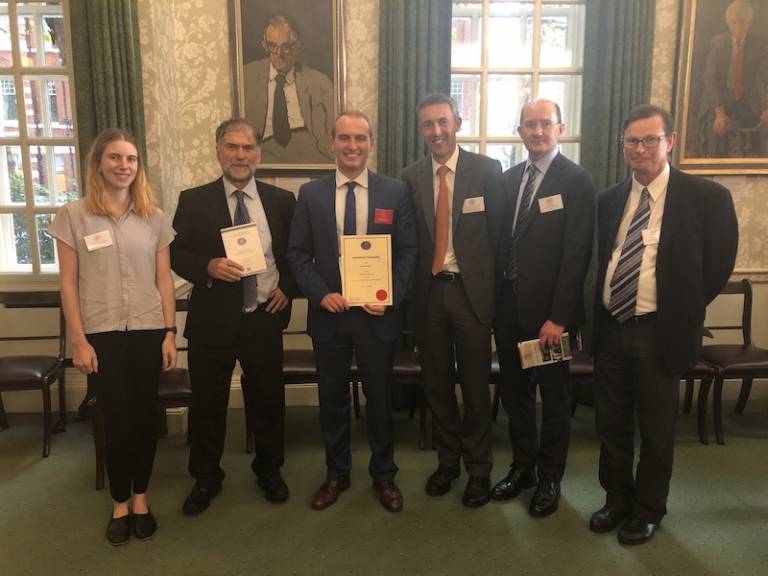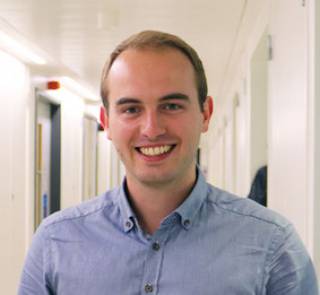CDT i4health student awarded Industrial Fellowship by Royal Commission for the Exhibition of 1851
1 October 2019
Bojidar Rangelov was awarded the fellowship for his project which uses machine learning to diagnose flare-ups of chronic obstructive pulmonary disease (COPD).

From left: Dr Alex Young (academic supervisor), Prof Dave Hawkes (academic supervisor), Bojidar Rangelov, Prof John Hurst (clinical supervisor), Fred Wilson (GSK industrial supervisor), Dr Tony Cahn (GSK clinical input)
The Royal Commission for the Exhibition of 1851 has awarded Industrial Fellowships worth up to £80,000 each to nine of the UK’s most talented young scientists and engineers. The funding from the Commission – set up by Prince Albert to organise the Great Exhibition of 1851 and extended by him in perpetuity to spend the substantial profits – will enable them to make an impact on their industry and wider society, by accelerating the development and commercialisation of new technologies. These Industrial Fellowships recognise the best research projects that could advance British industry, allowing companies to conduct innovative research that accelerates the creation of exploitable IP.
The technologies funded by the Fellowship include a new technique to improve success rates of a cancer treatment that uses gene editing to ‘hack’ the body’s cancer-fighting capabilities, harnessing artificial intelligence to predict long-term flooding trends, and a process similar to photosynthesis to produce a molecule that is widely used in drug fabrication. They also include a computer vision technique for automated identification of invasive species on ships’ hulls, and synthesising a naturally occurring chemical to improve cancer treatment by attacking cancer’s cellular defences.
Bernard Taylor, Chairman of the Royal Commission for the Exhibition of 1851, said: “Supporting British innovation is more important than ever before. These Industrial Fellowships provide an opportunity for British businesses to conduct cutting-edge R&D and develop intellectual property at reduced cost. This year’s Industrial Fellows include some of the brightest minds in fields spanning artificial intelligence and gene editing, and include new and exciting potential treatments for cancer. These promising young researchers represent the huge diversity of talent in science and engineering that Britain has to offer.”
The Industrial Fellowships provide graduates with up to £80,000 each to undertake doctoral studies, enabling them to develop innovative technologies with commercial potential in collaboration with a business and academic institution. The projects, funded for up to 3 years, will ideally lead to a patent or substantial business development, allowing the young researchers to conduct impactful research while gaining valuable industrial experience. The Fellowship programme plays a crucial role in facilitating the relationship between universities and industry in the UK, by offering highly valued funding for research and development into new intellectual property, totalling around £2 million every year.
The full list of 2019 Industrial Fellows are:
- Marie Dale, AkzoNobel and the University of Durham: Automated identification and predicted translocation of marine hull invasive species using artificial intelligence.
- Veronica Glyn, Autolus and University College London: improving accessibility for treatment and potential cure for aggressive cancers by reprogramming the patient’s own immune cells.
- Alexander O’Neill, Jaguar Land Rover and the University of Surrey: Building computer simulations of rubber tyre friction to improve virtual testing in the automotive industry.
- Elisabeth Pickles, Perspectum Diagnostics and the University of Oxford: Improving liver cancer diagnoses through new MRI techniques.
- Bojidar Rangelov, GSK and University College London: Using machine learning for diagnosing flare-ups of a common respiratory condition.
- Tatiana Rogova, GSK and the University of Oxford: Using light to produce a molecule at the heart of important medical treatments more quickly.
- Robert Rouse, Mott MacDonald and the University of Cambridge: Using AI to predict future macro flooding trends.
- Shaun Smart, TWI Ltd and the University of Leicester: Determination of boundary conditions for occurrence of weld metal hydrogen cracking, a process that occurs in metal fabrication that reduces the load-bearing capacity of metals.
- Jack Sutro, UCB BioPharma and the University of Oxford: Synthesising a naturally occurring molecule that shows promise in the treatment of multi-drug resistant cancers.
Applications for the 2020 Industrial Fellowships are now open. To learn more visit the website here.
 Close
Close


